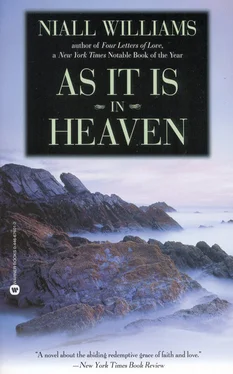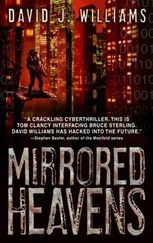Stephen brought her cocoa. He was stunned and wordless, and as the wet evening deepened into drowned night, his face expressed a mute horror. He put turf on the fire. He sat in the armchair across from Gabriella by the ruined chess game and tried to tell her everything would be all right. But Gabriella just stared. And so he did not say any more. He sat in the chair, long and thin and defeated, and in the dim light that glowed from the flames watched his happiness burn away like fire.
An hour passed. The rain fell.
“I love you,” he said in a small voice, when the light in the room was too diminished for him to tell whether Gabriella was awake or asleep and when the telling of those three words seemed suddenly impotent. There was no answer. Eight feet away Gabriella lay motionless. Her eyes might have been closed. Stephen did not know; he said the words again and immediately wished he had not, for in the loneliness of no reply he faced the cold, undeniable truth that Gabriella's happiness was not in his power, nor could he change the world for her. He sat and listened and the rain fell. At last he moved over beside her and reached and stroked her hand, and was still not certain that she was not sleeping, until finally the smallest movement of her fingers curved onto his and held.
In the darkness at the end of that night, when it seemed the world's sourness had slipped beneath their door and made the house of loving frail and unprotected as a china doll, Gabriella moved her face close to Stephen's, and in a voice that held the ceaseless yearning of her own childhood to make real and lasting the existence of love, she whispered, “Stefano, take me away from here.”
 It was the small hours of the morning. Rain was still beating against the windows when, with the tenderness of those who care for the wounded, Stephen took his arms from around Gabriella and rose from the couch where she was lying and began to pack. He did not discuss it. He did not explain his plans or try to reason with her or say that perhaps it was the rashness of her pregnancy speaking or a bright morning would see a change of heart. He rose and packed. Within an hour there was an assemblage of small boxes and vases, an Italian hilltown, inside the front door. When he opened the door to bring them to the car, the clatter of the rain made Gabriella stir on the couch. She raised her head slightly, the way sleepers do to look at dreams, and then lay back again.
It was the small hours of the morning. Rain was still beating against the windows when, with the tenderness of those who care for the wounded, Stephen took his arms from around Gabriella and rose from the couch where she was lying and began to pack. He did not discuss it. He did not explain his plans or try to reason with her or say that perhaps it was the rashness of her pregnancy speaking or a bright morning would see a change of heart. He rose and packed. Within an hour there was an assemblage of small boxes and vases, an Italian hilltown, inside the front door. When he opened the door to bring them to the car, the clatter of the rain made Gabriella stir on the couch. She raised her head slightly, the way sleepers do to look at dreams, and then lay back again.
Whether she was awake or not in his coming and going Stephen did not know. He gathered her clothes from the chairs and the end of the bed, where she had left them, and folded them into the brown case she had brought from Venice. Although there was space, he did not put his own clothes with hers. He took the case of her violin and the few books of sheet music she never travelled without, one of which had been given to her by Maestro Scaramuzza and was now like some yellowed covenant carried into the future. In his own case he packed the chess set, going around by the curtains on his hands and knees to gather up the pieces Gabriella had thrown aside.
At last he had packed everything that was theirs, except for the small black music player and Vivaldi, Puccini, and Mozart.
“Where are we going?” Gabriella whispered without moving. His long figure crossed the darkness to her.
“To make a home,” he said. “I am going to make you happy. I am.”
“Sssh,” she said, and raised a finger to quiet him. “Play the music, kill the rain.”
And so he did, and they lay in the last darkness as the rain fell in a world somewhere outside the otherworldly singing of Kiri Te Kanawa; Stephen and Gabriella held to each other and closed their eyes and escaped on the music away from the questions of tomorrow. They did not sleep. They drowsed on the disc that had been set to Repeat, and stirred on the fourth singing of “Dove sono” with paralyzing cramps and Gabriella's bladder bursting. Once she had rushed through the empty house, the mood was broken. She returned to where Stephen was hopping, trying to straighten the locked muscle of his thigh. He leaned on her shoulder. “My saviour,” she said as he hopped, and she smiled.
In ten minutes they were in the car. They drove into Kenmare in the dawn and saw the flooding waters of the street part to either side in the headlights. Gabriella wanted to leave word with Nelly Grant, and through the steady spilling of the rain she hurried up the small garden path while Stephen held an umbrella over her. She knocked twice, but there came no answer. She knew from her own nights in the cottage the deep dreams that Nelly Grant nightly explored and did not knock a third time; instead she wrote in pencil: “We had to leave. We will let you know. Thank you. Gabriella.” She did not add “Stephen,” nor see the small pain the absence of his name alongside hers caused him.
They drove out of Kenmare through empty streets and throttled the engine to climb into the mountains. Stephen told her they could go to Clare, and hurried the car as if to outrace the uncertainty of finding happiness there. They sped into Killarney and arrived in Tralee when only squat lorries and milk bulk tanks were travelling the road. The rain was still pouring down as the dawn came up, so that the grey light and water mixed to make the day the colour of despondency. In the emptiness of the long north Kerry road Stephen and Gabriella said almost nothing. Gabriella watched the landscape flattening out in pale greens towards the Shannon and wondered if the dry scent caught in the car was cardboard boxes or desperation. They arrived at the ferry dock in Tarbert a full hour before the first sailing, and waited and watched the morning struggle to separate from the dark waters of the river. When at last they drove onto the ferry, Tom Blake, the ticket collector, came and looked in at them across the falling rain. When he saw the collection of their belongings packed into the car, he knew they were not tourists and was at once disconcerted by the impression that they were people taking flight. As the boat pulled away, he watched the road down to the pier as if expecting pursuit.
But there was none he could see. For what they were fleeing was not visible; it was the condition of their own disbelief, a long, enduring, and dogged sense of defeat so deeply buried in the spirit that sometimes no love nor hope nor faith can seem to outrace it. It was the feeling that blows would always fall, that the state of happiness was somehow unnatural and would, by necessity, be brief, perishing under the persistence by which Time arrives and passes. It was that they were fleeing, but Tom Blake did not know it. He imagined when he saw them get out of the car and cross the rain-swept deck to climb the iron steps and look out at the grey-green lump of Clare that they were estimating how long the crossing would take, and how long it would be before the enemy was after them. And there was something — in the way the long man leaned to the small woman, in the shape of her, was that a child she was carrying inside the raincoat? in the blown-about crazy scent of lilies that could not be lilies — that made him change his view and nod and decide that he hoped they made it.
When they drove off into County Clare, the light was still pale and the rain falling. Tom Blake waved them off. “Good luck now,” he said, as if it were an innocent salute. They arrived up the sloped roadway at the café and souvenir shop, which was on the point of opening.
“Wait,” said Gabriella. Stephen stopped the car short. “Tea,” she said, “and a ring.”
He looked at her.
“It does not mean I am marrying you,” she said, raising an eyebrow and holding a half-smile, then turning away and looking at the rain that was not so heavy now, and waiting while the astonished man got out and crossed into the shop for the improbable purchase.
Читать дальше

 It was the small hours of the morning. Rain was still beating against the windows when, with the tenderness of those who care for the wounded, Stephen took his arms from around Gabriella and rose from the couch where she was lying and began to pack. He did not discuss it. He did not explain his plans or try to reason with her or say that perhaps it was the rashness of her pregnancy speaking or a bright morning would see a change of heart. He rose and packed. Within an hour there was an assemblage of small boxes and vases, an Italian hilltown, inside the front door. When he opened the door to bring them to the car, the clatter of the rain made Gabriella stir on the couch. She raised her head slightly, the way sleepers do to look at dreams, and then lay back again.
It was the small hours of the morning. Rain was still beating against the windows when, with the tenderness of those who care for the wounded, Stephen took his arms from around Gabriella and rose from the couch where she was lying and began to pack. He did not discuss it. He did not explain his plans or try to reason with her or say that perhaps it was the rashness of her pregnancy speaking or a bright morning would see a change of heart. He rose and packed. Within an hour there was an assemblage of small boxes and vases, an Italian hilltown, inside the front door. When he opened the door to bring them to the car, the clatter of the rain made Gabriella stir on the couch. She raised her head slightly, the way sleepers do to look at dreams, and then lay back again.









